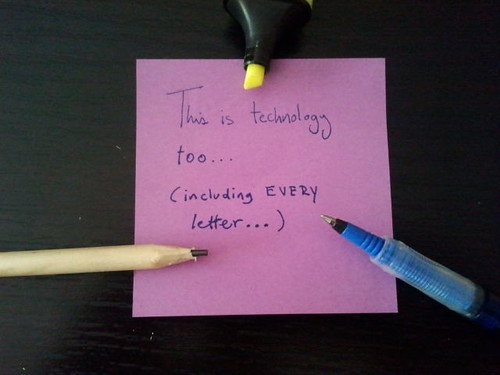I have been thinking a lot about the role of technology in class recently for a couple of reasons:

Much of the reading and discussion of the subject has focused on familiar ground:

it has been part of my online studies for my Trinity Dip TESOL (more on that in an upcoming series of posts) we had no internet at all in Gabon last week due to a major technical fault combined with all the telecom engineers being on strike (you can read about how that affected my lessons here)

Disagree! (See below) – Image via @mattleddig via #eltpics
what is technology exactly? (including the pedantic idea that the board, pens, and paper are all ‘technology’ of some sort – can’t we just agree that by now ‘technology’ in these discussions refers to digital technology?) do we have to use it? (of course not! You don’t have to do anything! Like any other tool at our disposal though, it pays to be aware of its potential uses and affordances) ‘digital natives’ and ‘digital immigrants’ (why are we still talking about this when even Prensky himself has moved on? Growing up in a connected world does not make anybody naturally proficient at using tech) the interactivity of interactive whiteboards (interactive being used here in the person-machine and not the person-person sense)
If you suddenly found yourself with no access to technology (the digital kind!) would you still be able to do a good job of teaching your students? Or would you go into a blind panic? If you were suddenly told you had to start using a particular piece of software or hardware, would you be able to evaluate when and how to use it most effectively and apply that to your lessons? Or would you go into a blind panic?

Picture by Sue Lyon-Jones via #eltpics
Although you think it's pedantic Dave, I think there's a good reason to consider the board, pens and paper as technology. By doing this, it means that we have to use the same assessment criteria when considering their use in the classroom. By hiving them off into a different category, there is a temptation to give them special treatment because they are 'new' and 'shiny'. Treating them as tools as mundane as a pen makes it easier to evaluate them fairly.
ReplyDeleteJust wrote a lengthy response to this and Blogger just swallowed it up... Aaargh!
DeleteAnyway, to summarise James, after greeting you and thanking you for your comment, I said something like this:
I agree with your point that we should not see technology (digital, that is) as something 'special'. Nor should we see it as something to be feared (that's what I was trying to get at with my two questions).
However, I disagree that we should see them as the same for the simple reason that I could not do my job the same way without those pens, pieces of paper, or the board. They are essential resources that really transform the in-class learning process. Without them, I might manage for a while with discussion-driven and conversation-based classes but without the board to highlight key language points on or pens and paper for students to make notes, jot down ideas, and write texts or multiple kinds, we would soon be struggling.
The digital stuff, despite its usefulness, ability to enhance certain aspects of the lesson, and how it makes some things easier, is very much dispensable. We can manage without the new tech but not the old.
Pens, paper and all that non-digital stuff - those are essential resources for me and not something I can categorise in the same group as useful but not essential 'technology'.
I was going to say exactly what James said, and it's a point I make in my CELTA technology seminar. However, I see your point too Dave - thanks for addressing it! (And I know I didn't add to the discussion in any way, so don't feel obligated to reply!)
ReplyDeleteSandy
So, two comments and they both pick up on a side comment rather than the main point! :p
DeleteBut always a pleasure to hear different perspectives and to receive comments - these are the moments when reflection can go beyond the descriptive and into the critical! :)